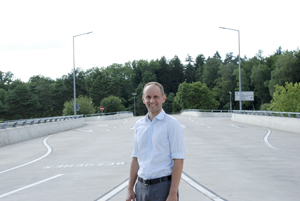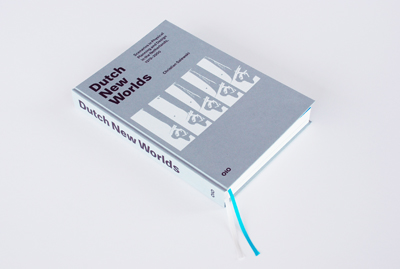ETH Zurich – Institute for Urban Design
HIL H44.1 – Stefano-Franscini-Platz 5 – 8093 Zurich
contact

Christian Salewski, born 1974, is an architect and urban designer, and founder-partner of Christian Salewski & Simon Kretz Architekten in Zurich . He is Senior Assistant and Lecturer for Urban Design at ETH Zurich, Lecturer for Urban Design at the University of Liechtenstein, and Lecturer at the University of Zurich and at the University of St. Gallen.
As trained and experienced architect, urban designer, and strategic planner, his aim is to better understand the complex interaction of contemporary socio-economic conditions and the built environment, and to find out what designers and planners can contribute on all scales from the house to the international territory.
Christian is an expert on infrastructure and urban development and an active researcher in the research platform Airports and Cities, which he co-initiated and lead from 2008 to 2014. His focus is on investigating the complex reciprocity of urban and airport development in an international perspective, lecturing and publishing internationally for researchers, airport operators, and public stakeholders.
Based on his PhD-research, which was awarded the ETH Medal of Excellence, Christian has become an internationally renowned authority on the scenario method in urban and regional design. In 2012, his book "Dutch New Worlds. Scenarios in Physical Planning and Design in the Netherlands.1970-2000" was published in English and in Dutch by 010 publishers Rotterdam. It was widely reviewed and received the International Planning History Society’s biennial prize for the most innovative book in 2014. He frequently lectures and teaches master classes on scenarios.
Christian’s work has earned grants from the German National Scholarship Foundation. DAAD, Netherlands Architecture Fund, Dutch Science Organisation NWO, ETH Zurich, and EIT Climate-KIC. He studied architecture in Berlin and Lausanne, and holds a Masters equivalent from TU Berlin and a PhD from ETH Zurich. Reaching out beyond academia, Christian is a prolific writer, lecturer, guest critic, and moderator.
Before joining ETH Zurich, Christian has worked as architect and urban designer at KCAP Architects and Urban Planners Rotterdam and Thomas Müller Ivan Reimann Architekten Berlin on projects in the Netherlands, China, and Belgium, and has taught urban design at TU Dresden from 2004 to 2006.
In praxis, he is working as architect, urban designer, and jury member for complex urban projects. His latest project is a masterplan for the inner-city conversion of the 2ha Warmbächliweg area in Bern (in cooperation with BHSF Architekten Zurich).
Links to current publications on the internet:
Economies of Scale: Skaleneffekte als Treiber typologischer Innovation in Architektur und Städtebau, Archithese 04/2014 (in German)
Urbanity of Things: Relationship Wealth and Relationship Potential as Resource in: City as Ressource, 2014/ArchiNed, 06. Oktober 2014
Back to the Future?, Review of Dutch New Worlds by Allard Jolles, ArchiNed, 05. November 2014 (in Dutch)
The Politics of Planning: From Social Engineering to the Engineering of Consent Scenarios for Almere, Markerwaard, and New Netherlands 2050 (1965-1985), INTI International New Town Institute (2014)

Dutch New Worlds: Scenarios in Physical Planning and Design in the Netherlands, 1970-2000, 010 Publishers Rotterdam 2012
Our decisions shape our future, but we know little about how. To find out, planners and designers construct vivid images of what could be. These scenarios serve as path-breakers between imagination and reason. In the late 1980s, the elite of Dutch planning and design took scenarios to unprecedented scales to convince the public of their ideas. But the quest to reshape the Netherlands as a whole failed dismally. Their attempt, however, unleashed a wave of new thinking about the future and created an enormous number of spectacular images of things to come. Dutch New Worlds tells for the first time the story of how scenario thinking changed urbanism and physical planning, from its beginning in the late 1960s to its height in the 1990s. It shows how most grand scenario projects came to nothing because of overambition and misuse. It also shows how, today, scenarios remain powerful tools for focused and transparent design research to create better cities and regions. Told from the perspective of an architect and urbanist, this history of ideas holds fundamental lessons for planners, designers, and policy makers – and for our next decisions that will shape our future.
Dutch New Worlds - Urban Design Scenarios in the Netherlands, 1970-2000,
Diss., Eidgenössische Technische Hochschule ETH Zürich, Nr. 19286, 2010
DOI: 10.3929/ethz-a-006278759
supported by HGIS cultural fund/ The Netherlands Architecture Fund, the Netherlands, 2008-2010
Contact:
Dr. Christian Salewski
ETH Zürich – Institut für Städtebau
ONA G 41, Neunbrunnenstrasse 50, 8093 Zürich
phone +41 44 633 67 61
mobile +41 77 429 63 34
salewski @ arch.ethz.ch
This website has been archived and is no longer maintained.